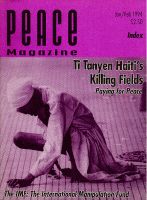
Peace Magazine Jan-Feb 1994, page 12. Some rights reserved.
Search for other articles by Dietrich Fischer here
Financing the UN
President Clinton, in his first address to the U.N. General Assembly, called on the United Nations to be more selective about where it sends troops in the future, saying the United States could not afford to go on subsidizing open-ended missions. U.N. Secretary General Boutros-Ghali, on the other hand, argued that if the forces of chaos concluded that the United Nations was short of breath, they would prevail simply by waiting for the world to turn its attention elsewhere. Can these two positions be reconciled?
The U.S. government's planned auction of a portion of the domestic airwave spectrum, by which it expects to raise about $10,000 million, suggests a mutually beneficial solution. There is growing agreement that allocating scarce resources, such as airwaves, on a "first come-first serve" basis or through a lottery, as was common in the past, is inefficient. It does not necessarily put these resources in the hands of those who can make the best use of them. For this reason, governments increasingly resort to auctions to allocate such items as oil drilling leases, mining rights, radio waves, and television channels to the highest bidder. Such allocations should not be permanent, but reopened for bidding every ten years or so.
An example of a global resource is the limited number of 180 positions for geostationary satellites. They used to be issued for free as countries requested them one by one. When only 23 positions were left, an American businessman persuaded the Queen of Tonga to claim the rest, planning to rent them to others at a high profit. The International Telecommunications Union faced the dilemma of whether or not to grant that request. It finally decided to grant only six spots, to forbid renting them to others, and to claim them back if they were not actually used by Tonga. Giving scarce resources away for free invites such frivolous claims, whereas competitive bidding tends to allocate them to the most efficient users and simultaneously raises some revenue.
Who should auction spots for geostationary satellites, the limited spectrum of shortwaves for broadcasts around the world, or mining rights on the deep seabed outside a country's jurisdiction? Clearly, no nation can claim the right to sell those resources to others. The natural auctioneer is the United Nations.
Developing countries, which cannot yet compete on an equal basis in such auctions,should be given a fair share, for example by allocating 50% of global resources according to population while auctioning the rest. Developing countries would further benefit from such auctions since they would make greater resources available to finance development projects.
Auctioning scarce resources can also help prevent conflicts. When oil was first discovered in the last century in Texas, there were no rules and some rival oil companies bombarded each other's drilling towers to get at the oil first. Today they appreciate that the U.S. government grants exclusive drilling rights for a parcel of territory to the highest bidder. They pay something, but in return they enjoy security. A similar service is needed at the global level, to prevent future wars over global resources. It would also help raise some badly needed funds to address global problems.
The United Nations is now vastly underfunded. The annual U.N. budget is less than what New York City spends for its police, and with that amount the U.N. is expected to solve problems all over the world. World military spending in 1992 exceeded by a factor of 700 the $1,333 million for all U.N. peacekeeping operations, including preparations for the first democratic elections in Cambodia that ended a long and brutal civil war.
Jan Tinbergen, co-recipient of the first Nobel Prize for economics, observed that almost every ministry at the national level corresponds to some international organization, with the exception of a treasury. Yet without a treasury, which collects taxes and uses them to finance all the other ministries, any government would soon collapse. He therefore proposes the creation of a World Treasury, which could finance peacekeeping, development and protection of the global environment. Agreement on global income taxes is not likely soon, but a World Treasury could raise revenue by auctioning global resources. It would be the logical institution to perform this essential role. Of course, an international board of respected personalities, or ultimately an elected world parliament, should oversee the proper use of the funds raised in this way and ensure accountability at all levels.
Such a method to help finance U.N. peacekeeping operations and sustainable development has five advantages: First, it frees financially pressed governments from paying ever higher contributions. Second, it gives the United Nations and its family of international organizations a more reliable source of funds to meet urgent global needs. Third, it avoids divisiveand difficult negotiations over how much each country should contribute, since the richer countries naturally end up paying a higher share. Fourth, it uses market principles to improve the efficiency of allocating scarce resources. And fifth, it helps prevent possible future wars over those resources.
Dietrich Fischer, a professor at Pace University and board member of Economists Allied for Arms Reduction, is the author of Nonmilitary Aspects of Security.

Peace Magazine Jan-Feb 1994, page 12. Some rights reserved.
Search for other articles by Dietrich Fischer here